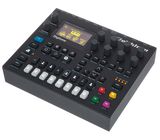I love everything about this little machine: it's sturdy, feels good, looks super pretty, the sound engine is massive, and the effects work great on external signals too (I used its chorus, distortion and delay for guitar and analog synths).
the UI is quite hands-on and very intuitive: in 3 yrs of using it I don't think I have checked the manual... it's just some menu diving on less frequently used options like re-mapping midi channels. Most things just work the way you expect them to, e.g. hold ,,copy'' and push whatever you want to copy (trigger/note, track, synth setting)... The only (slight) pain is switching between views while playing (to alter amount of reverb or attack on the envelope) because they require holding ,,shift'', so either wild fingers streching or taking hand of the keyboard for a short while... Still it's super playable ,,as an instrument'' (i.e. a proper synth, not ,,just a groovebox'').
Then the sequencer, it's fantastic! At first I didn't like the fact there's no step interface (entering notes one-by-one), BUT turned out with copy and transpose it's like impulsetracker.
The FM engine is ace, so clean! It's not entirely true it's 4op because you can stack voices with Unison settings (so effectively it's more like 16op with towers of at most 4 ops?). It's not that easy to make glitchy noises (like on, say, DX27) but it is doable: altering the waveshape, some feedback, offsets et voila, sounds as ugly as you please.
And it seems to be always normalized? I mean there's no ,,too quiet'' problem of less harmonically-riched sounds like when programming the DX.
The only thing which I found disappointing was the arpeggiator can't be set to send notes over MIDI. Even if you play it, there's just the chord being sent...
Oh I forgot: the display is really well contrasted. Even on a very sunny day and looking from an angle, it's still easy to read.
All in all, digitone is a modern classic.

